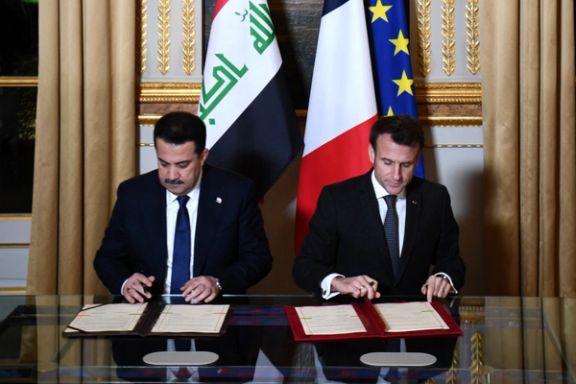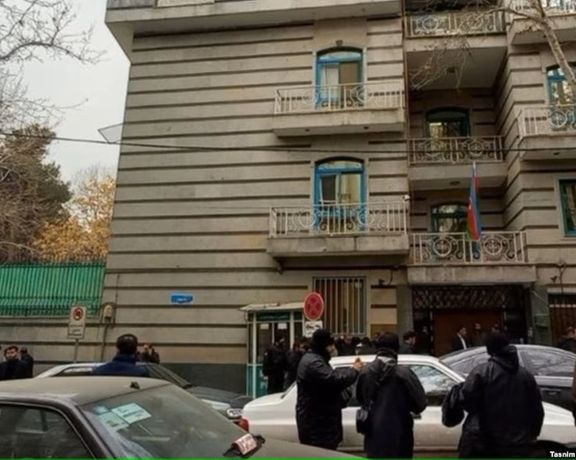Iraq, France Sign Deal To Bolster Energy, Security Ties

About a month after France called for curbing the Islamic Republic’s influence in Iraq, Paris and Baghdad have signed a strategic cooperation agreement.

About a month after France called for curbing the Islamic Republic’s influence in Iraq, Paris and Baghdad have signed a strategic cooperation agreement.
French President Emmanuel Macron held a meeting with Iraq Prime Minister Mohammed Shia al-Sudani on Thursday in which they inked a set of strategic agreements meant to boost Baghdad's economic cooperation with Paris, especially in the energy and public transportation sectors.
"I just signed the Strategic Partnership Agreement with my friend Mr. Macron, which sets a roadmap for expanding the horizons of cooperation between our two countries in various fields," read a tweet from the Iraqi PM following his reception by the French president.
In a statement issued in the early hours of Friday, the Elysee Palace said France and Iraq also signed a treaty seeking to strengthen bilateral relations in anti-corruption, security, renewable energy and culture.
"(Macron and Shia al-Sudani) have reaffirmed their commitment to complete big network infrastructure projects based on French knowhow (...) In that respect they have pledged to grant Iraq the expertise of French companies," read the statement, adding that "In terms of alternative energies, they showed their commitment to the implementation of TotalEnergies's multiple-energies project (...) based on solar energy and investments in gas."
Macron in December attended the second gathering of the Baghdad Conference for Cooperation and Partnership in Jordan, which aimed at providing support for Iraq’s stability and security. The summit, which was held on the shores of the Dead Sea, brought together twelve countries of the region, including the archenemies Saudi Arabia and the Islamic Republic. Tehran's policies of intervening in other countries affairs was condemned at the “Baghdad II” summit.

A newspaper in Iran says the parliament's plan to add two new articles to the 'Islamic Penal Code' could further restrict civil liberties and freedom of speech.
According to Etemad newspaper, based on the new legislation, making any comment about the state of affairs in the country can land people in trouble, particularly politicians, political activists and celebrities.
The newspaper said that lawmakers at the Judiciary Committee wish to make sure that all public comments are identical with official version of developments. The headline of Etemad's report said: "Watch your mouth, you might be punished if what you say is different from the official reading!"
The paper said that the motion at the Majles is currently called "Adding one article to Chapter five of the Islamic Penal Code." The report in Etemad further opined that the new legislation may mainly target "well-known and famous" individuals.
The parliament had previously tabled another motion dubbed, "Adding two articles to Chapter five of the Islamic Penal Code," which called for changing articles 499 and 500 of the law. The new article 499 now calls for more severe punishment for those who "insult ethnic or religious minorities with the aim of instigating violence and tension," and the new article 500 intensifies the punishment of "those who commit criminal offenses against law enforcers and government buildings."
The amendments were made in December following months of protests in Iran during which occasional clashes occurred between heavily armed security forces such as the IRGC, police special forces, the Basij militia and plainclothes officers who attacked unarmed protesters.
The new change is about article 512 of the penal code which is about "those who provoke the people in order to disrupt the country's security through instigating war, massacres and civil strife."
The sentence for those who were charged with related offenses was imprisonment for five years, but the new addition is aimed at intensifying the punishment and making it easier for the courts to apply the article on anyone in jail as it is known today by human rights organizations that inmates are made to confess to crimes they have never committed.
The new legislation extends the duration of imprisonment to up to 15 years and also calls for the payment of up to 550 million rials no matter if the act committed "will or will not lead to murder and destruction of property."
Meanwhile, the new addition to the law says, "Anyone with a good job or with a good social standing or anyone who is a cultural, scientific, or military figure, even those with a high standing in their family" might be subjected to the new punishments "if they make a comment prior or contrary to official views about the state of the affairs in the country whether by word of mouth or on social media."
The legislation also warns that in certain cases, such comments might be assessed as "spreading corruption on the Earth," which entails death sentence.
The website of the Iranian parliament has restricted access to this part of the law based on users IP to bar foreigners and Iranians living abroad from accessing it or possibly telling the rest of the world about what Iran is doing to restrict civil liberties. The error message says: "Access denied --The request has been blocked from your IP at your location! This is due to some security settings of the website."
Based on this new legislation, an event such as the murder of Mahsa Amini in police custody should not be discussed on social media or otherwise as long as there is no definitive official attestation. In other words, no one can contradict what the government says about all issues, including for example inflation. A complaint about high prices could be interpreted as instigating unrest.
Mousa Ghazanfarabadi, the chairman of the Majles Judiciary Committee told Etemad that the new legislation is still being reviewed and its aim is to include “fake news, lies and rumors” within the jurisdiction of article 512. He mentioned Mahsa Amini's case and said that anyone makes a comment about the matter which could be categorized as lies, rumors and fake news will be additionally sentenced to up to ten years of deprivation from their social rights, and will be barred from going back to their job.

An armed attacker who entered the Azerbaijani embassy in Tehran and opened fire killing one person was arrested, the city’s police chief said.
Fars news website affiliated with Iran’s Revolutionary Guard quoted police chief as saying, “This individual today morning entered the Azerbaijani embassy with a gun opened fire and in this incident one person was killed and two were injured.”
He added, “With quick police action the individual was arrested, and an investigation is under way. The person entered the embassy with his two small children. He has indicated that he had personal and family difficulties.”
Other reports say the individual who was armed with an AK-47 assault rifle gained access to the compound when an embassy employee was entering the building.
The Azerbaijani foreign ministry issued a statement saying, "The attacker broke through the guard post, killing the head of security with a Kalashnikov assault rifle.”
It added that an "anti-Azerbaijani campaign" in Iran had contributed to the attack.
In a strongly worded statement, the Azeri ministry also accused Iran of long ignoring Baku's calls to bolster security at its embassy in Tehran.
"Unfortunately, the latest bloody terrorist act demonstrates the serious consequences of the failure to give the necessary attention to our constant appeals in this regard," it said.
Both Iranian and Azerbaijani officials say further information will be issued as the investigation reveals more details.

Following demonstrations in Iraq over the recent slide of the Iraqi dinar against the dollar, a delegation of Iraqi officials will travel to Washington to resolve issues related to US banking restrictions.
As hundreds of people demonstrated near the central bank headquarters in Baghdad on Wednesday to protest the devaluation of the Iraqi dinar against the dollar, which has triggered a rise in prices of imported consumer goods, an informed source told Iran International that representatives from the Iraqi government are scheduled to go to US next month to investigate the smuggling of dollars from Iraq to Iran.
People from different Iraqi regions waved Iraqi flags or carried banners demanding government intervention to stop the dinar's decline to around 1,620 to the greenback from 1,470 in November. “Stop the neighbors stealing our dollars,” one banner read, alluding to Iran. The protesters demand that the government must intervene to stop the decline of dinar value because people are suffering from high prices in local markets.
According to Iran International’s source, who asked not to be named, it is not clear whether Iraqi Prime Minister Mohammed Shia' Al Sudani will head the delegation or not. The visit could take place in early February.
The dinar went into a tailspin against the dollar after the New York Federal Reserve imposed tighter controls on international dollar transactions by commercial Iraqi banks in November to halt the illegal siphoning of dollars to neighboring Iran, which is under tough US sanctions.

The move blocked more than 80 percent of Iraqi bank transfers. Under the curbs that took effect this month, Iraqi banks must use an online platform to reveal their transaction details. But most private banks have not registered on the platform and resorted to informal black markets in Baghdad to buy dollars.
This has created dollar shortages as demand has outstripped supply and accelerated the dinar's descent against the greenback. The Wall Street Journal recently reported that the intensification of pressure on the Islamic Republic has caused the value of Iraq's currency to drop.
Sudani replaced the central bank governor on Monday as he had not taken effective steps to tackle the consequences of the new Fed regulations and their impact on the dinar.
Late in December, an informed source in Baghdad told Iran International that Washington has received reports on Iraq conducting trade with Iran using US dollars despite US sanctions. This source added that the names and bank account numbers that have secretly interacted with Iran have not yet been revealed, but the Biden administration has found out that a large amount of US dollars has been transferred from Iraq to some countries, including Iran.
The Islamic Republic needs Dollars to stabilize its deteriorating economy hit hard by US sanctions imposed since 2018 after then-US President Donald Trump ditched Tehran's nuclear deal with six world powers. Iran's troubled currency has lost more than 30% of its value since nationwide protests following the death in police custody of a young 22-year-old Iranian woman, Mahsa Amini, on September 16, 2022 that have further isolated the country.
For years, the clerical establishment has used front companies from Iraq to Turkey to obtain the dollars it needs for international transactions and funding its proxy militia forces across the Middle East.

As scores of journalists have been arrested during the protests in Iran, Reporters Without Borders (RSF) announced that the Islamic Republic is determined to block all information channels.
Referring to detention of journalists in Iran, the RSF Executive Director Christian Mihr said Wednesday "It is important that the world learns about the brutality of the Iranian regime."
He said despite the arrests and threats to journalists in Iran, they "bravely continue to do their work."
According to the organization, since uprising against the regime in Iran, at least 55 journalists, including 16 female ones, have been arrested, and 27 of them are still behind bars.
The RSF further went on to say that 28 others were set free with large bails, but heavy prison sentences have been issued for a number of journalists.
Since the beginning of 2023, eight journalists have been arrested and four of them have been temporarily released on bail.
The Committee to Follow up on Situation of Arrested Journalists has prepared a list of these people saying at least 24 journalists are still under arrest.
Elaheh Mohammadi and Niloufar Hamedi, who published the news about the death of Mahsa Amini in police custody for the first time, are among the ones behind bars.
After their arrest, the Intelligence Organization of the Revolutionary Guard and the Ministry of Intelligence issued a joint statement accusing the two of espionage.

France says the Islamic Republic must release the Franco-Irish citizen Bernard Phelan immediately and provide him access to urgent medical care.
The Foreign Ministry on Thursday said Phelan, who is detained in Iran, must be set free as soon as possible.
Foreign Ministry spokesperson Anne-Claire Legendre told journalists that Paris is very concerned about Phelan’s poor health condition.
"The denial of medical access by Iranian authorities is unacceptable", she noted.
Several European citizens are imprisoned in Iran, but only the names of some of them have been published.
Bernard Phelan was arrested on October 3 during anti-regime protests that have swept the country following the death of Mahsa Amini in police custody on September 16.
He has been on hunger strike since the beginning of the New Year, but on Friday he accepted to eat upon the request of his family.
However, Phelan warned if there is no improvement in his situation, he will go on hunger strike again.
Bernard Phelan, 64, who is a travel consultant has been accused by the Islamic Republic of "propaganda against the establishment" and "photographing police and security officers". He is imprisoned in Vakil Abad prison in Mashhad northeast of Iran.